The Role of Self-Efficacy and Gender on Mental Well-Being, Colombo
VerifiedAdded on 2020/04/13
|20
|4663
|216
Report
AI Summary
This report, submitted to the Faculty of Health and Life Sciences at Coventry University, investigates the influence of self-efficacy and gender on mental well-being among adults aged 18-60 in the Colombo suburbs. The study employed a descriptive cross-sectional design with 114 participants, utilizing a Two-way ANOVA to analyze the interaction between self-efficacy and gender. The findings revealed a statistically significant interaction between self-efficacy and mental well-being, supporting the hypothesis that self-efficacy acts as a predictor of mental well-being, but the study found no significant interaction between gender and mental well-being. The report includes a literature review on self-efficacy and mental well-being, exploring their impact on various psychological factors. The study highlights the need for further research emphasizing the role of gender in predicting mental well-being in the Sri Lankan context. This study is crucial for understanding the factors affecting mental well-being and emphasizes the need for future research to explore the influence of gender.
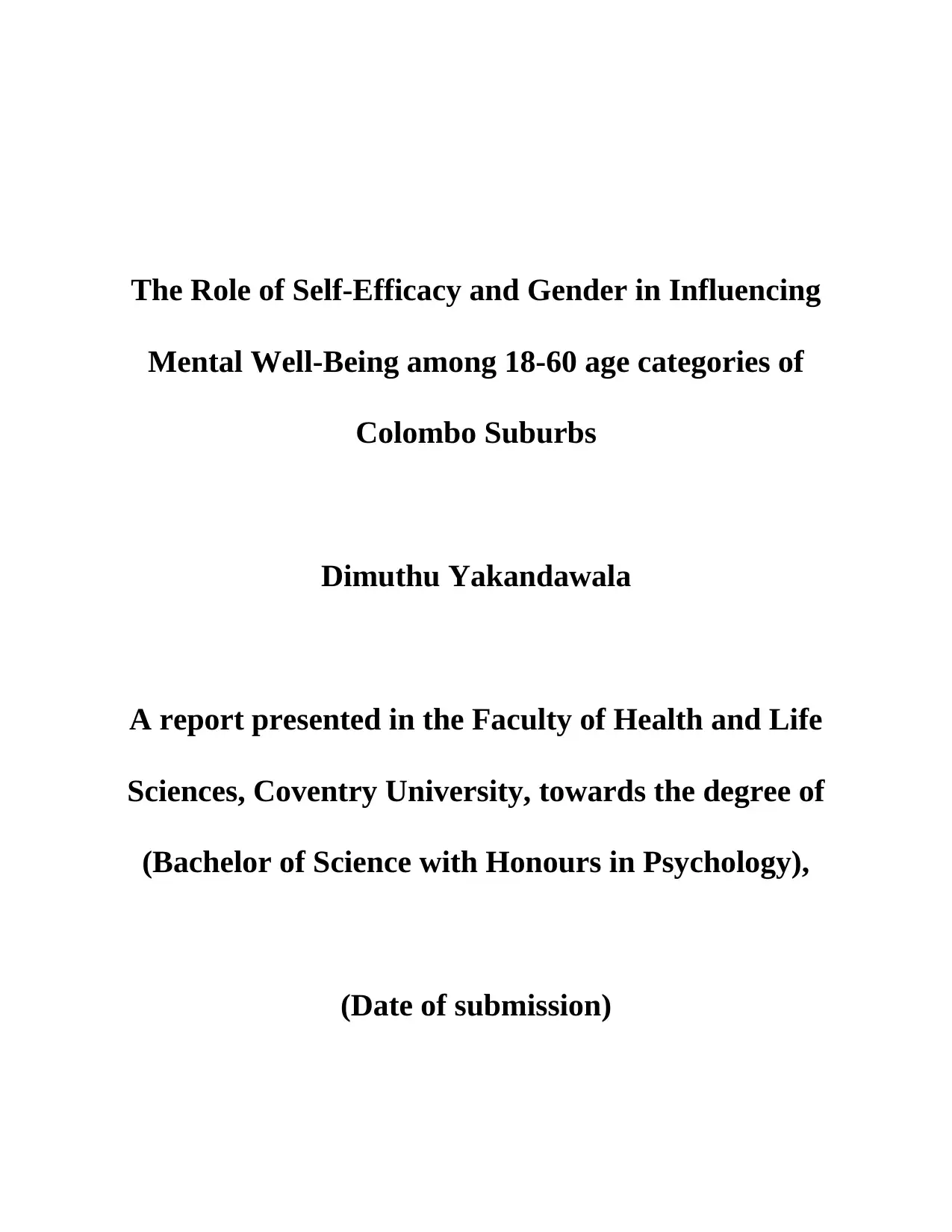
The Role of Self-Efficacy and Gender in Influencing
Mental Well-Being among 18-60 age categories of
Colombo Suburbs
Dimuthu Yakandawala
A report presented in the Faculty of Health and Life
Sciences, Coventry University, towards the degree of
(Bachelor of Science with Honours in Psychology),
(Date of submission)
Mental Well-Being among 18-60 age categories of
Colombo Suburbs
Dimuthu Yakandawala
A report presented in the Faculty of Health and Life
Sciences, Coventry University, towards the degree of
(Bachelor of Science with Honours in Psychology),
(Date of submission)
Paraphrase This Document
Need a fresh take? Get an instant paraphrase of this document with our AI Paraphraser
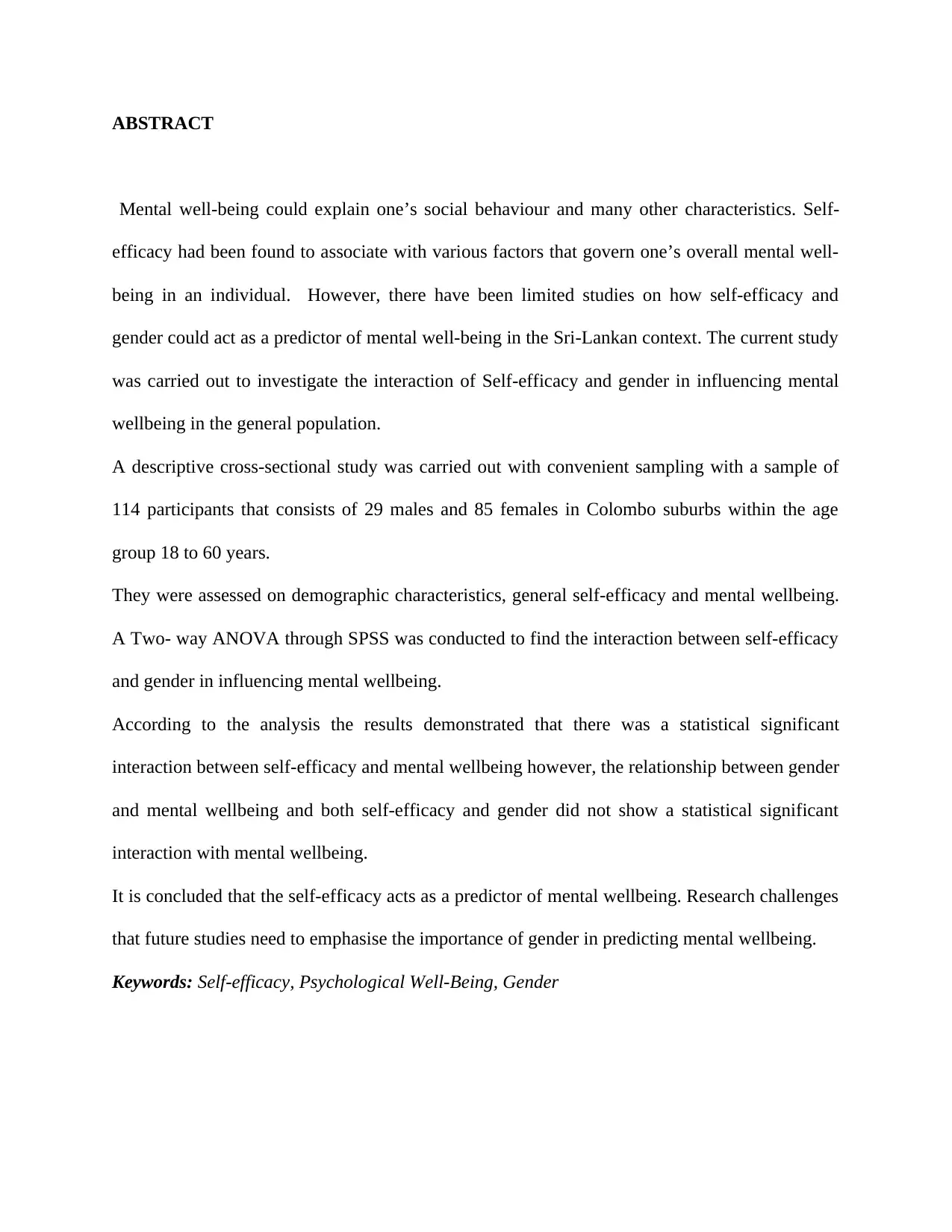
ABSTRACT
Mental well-being could explain one’s social behaviour and many other characteristics. Self-
efficacy had been found to associate with various factors that govern one’s overall mental well-
being in an individual. However, there have been limited studies on how self-efficacy and
gender could act as a predictor of mental well-being in the Sri-Lankan context. The current study
was carried out to investigate the interaction of Self-efficacy and gender in influencing mental
wellbeing in the general population.
A descriptive cross-sectional study was carried out with convenient sampling with a sample of
114 participants that consists of 29 males and 85 females in Colombo suburbs within the age
group 18 to 60 years.
They were assessed on demographic characteristics, general self-efficacy and mental wellbeing.
A Two- way ANOVA through SPSS was conducted to find the interaction between self-efficacy
and gender in influencing mental wellbeing.
According to the analysis the results demonstrated that there was a statistical significant
interaction between self-efficacy and mental wellbeing however, the relationship between gender
and mental wellbeing and both self-efficacy and gender did not show a statistical significant
interaction with mental wellbeing.
It is concluded that the self-efficacy acts as a predictor of mental wellbeing. Research challenges
that future studies need to emphasise the importance of gender in predicting mental wellbeing.
Keywords: Self-efficacy, Psychological Well-Being, Gender
Mental well-being could explain one’s social behaviour and many other characteristics. Self-
efficacy had been found to associate with various factors that govern one’s overall mental well-
being in an individual. However, there have been limited studies on how self-efficacy and
gender could act as a predictor of mental well-being in the Sri-Lankan context. The current study
was carried out to investigate the interaction of Self-efficacy and gender in influencing mental
wellbeing in the general population.
A descriptive cross-sectional study was carried out with convenient sampling with a sample of
114 participants that consists of 29 males and 85 females in Colombo suburbs within the age
group 18 to 60 years.
They were assessed on demographic characteristics, general self-efficacy and mental wellbeing.
A Two- way ANOVA through SPSS was conducted to find the interaction between self-efficacy
and gender in influencing mental wellbeing.
According to the analysis the results demonstrated that there was a statistical significant
interaction between self-efficacy and mental wellbeing however, the relationship between gender
and mental wellbeing and both self-efficacy and gender did not show a statistical significant
interaction with mental wellbeing.
It is concluded that the self-efficacy acts as a predictor of mental wellbeing. Research challenges
that future studies need to emphasise the importance of gender in predicting mental wellbeing.
Keywords: Self-efficacy, Psychological Well-Being, Gender
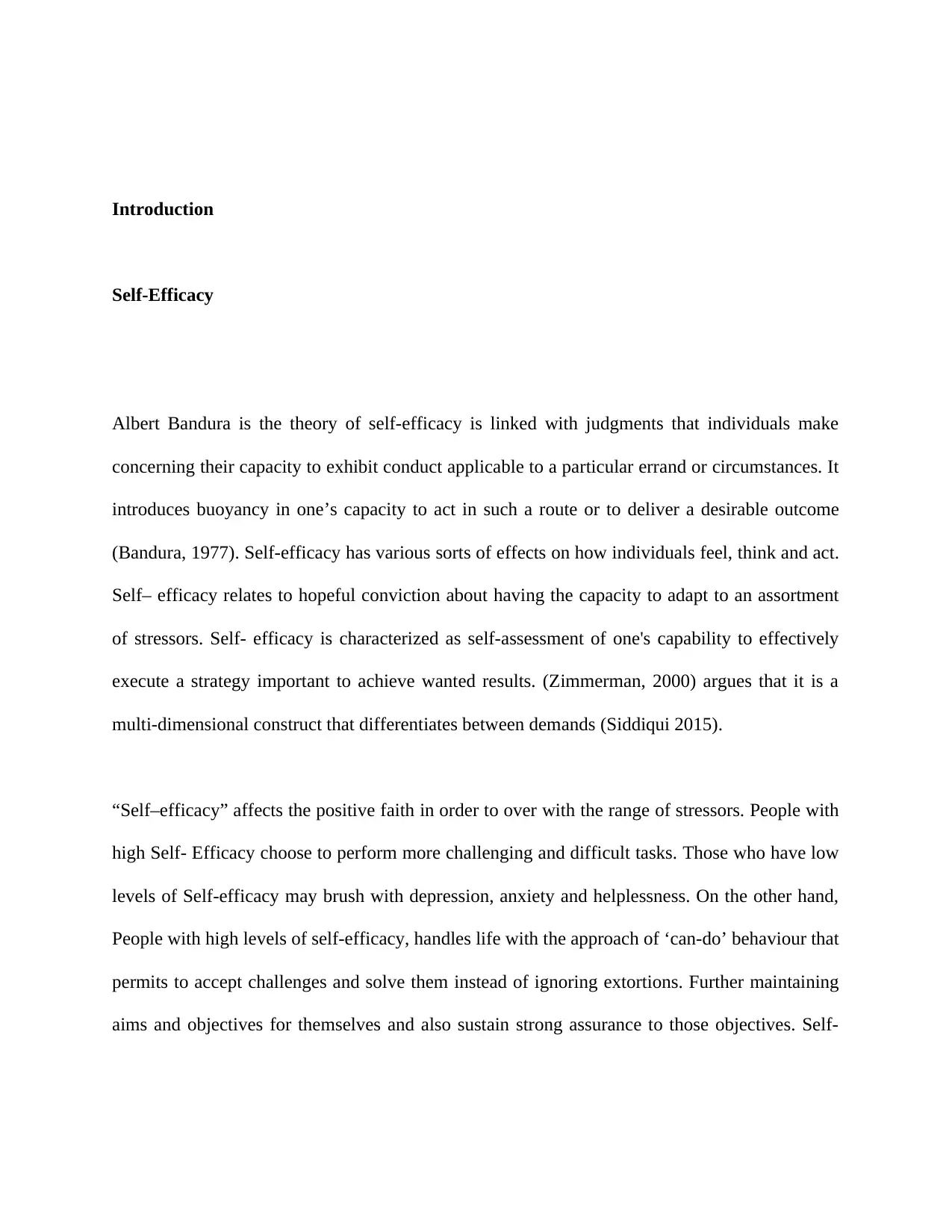
Introduction
Self-Efficacy
Albert Bandura is the theory of self-efficacy is linked with judgments that individuals make
concerning their capacity to exhibit conduct applicable to a particular errand or circumstances. It
introduces buoyancy in one’s capacity to act in such a route or to deliver a desirable outcome
(Bandura, 1977). Self-efficacy has various sorts of effects on how individuals feel, think and act.
Self– efficacy relates to hopeful conviction about having the capacity to adapt to an assortment
of stressors. Self- efficacy is characterized as self-assessment of one's capability to effectively
execute a strategy important to achieve wanted results. (Zimmerman, 2000) argues that it is a
multi-dimensional construct that differentiates between demands (Siddiqui 2015).
“Self–efficacy” affects the positive faith in order to over with the range of stressors. People with
high Self- Efficacy choose to perform more challenging and difficult tasks. Those who have low
levels of Self-efficacy may brush with depression, anxiety and helplessness. On the other hand,
People with high levels of self-efficacy, handles life with the approach of ‘can-do’ behaviour that
permits to accept challenges and solve them instead of ignoring extortions. Further maintaining
aims and objectives for themselves and also sustain strong assurance to those objectives. Self-
Self-Efficacy
Albert Bandura is the theory of self-efficacy is linked with judgments that individuals make
concerning their capacity to exhibit conduct applicable to a particular errand or circumstances. It
introduces buoyancy in one’s capacity to act in such a route or to deliver a desirable outcome
(Bandura, 1977). Self-efficacy has various sorts of effects on how individuals feel, think and act.
Self– efficacy relates to hopeful conviction about having the capacity to adapt to an assortment
of stressors. Self- efficacy is characterized as self-assessment of one's capability to effectively
execute a strategy important to achieve wanted results. (Zimmerman, 2000) argues that it is a
multi-dimensional construct that differentiates between demands (Siddiqui 2015).
“Self–efficacy” affects the positive faith in order to over with the range of stressors. People with
high Self- Efficacy choose to perform more challenging and difficult tasks. Those who have low
levels of Self-efficacy may brush with depression, anxiety and helplessness. On the other hand,
People with high levels of self-efficacy, handles life with the approach of ‘can-do’ behaviour that
permits to accept challenges and solve them instead of ignoring extortions. Further maintaining
aims and objectives for themselves and also sustain strong assurance to those objectives. Self-
⊘ This is a preview!⊘
Do you want full access?
Subscribe today to unlock all pages.

Trusted by 1+ million students worldwide
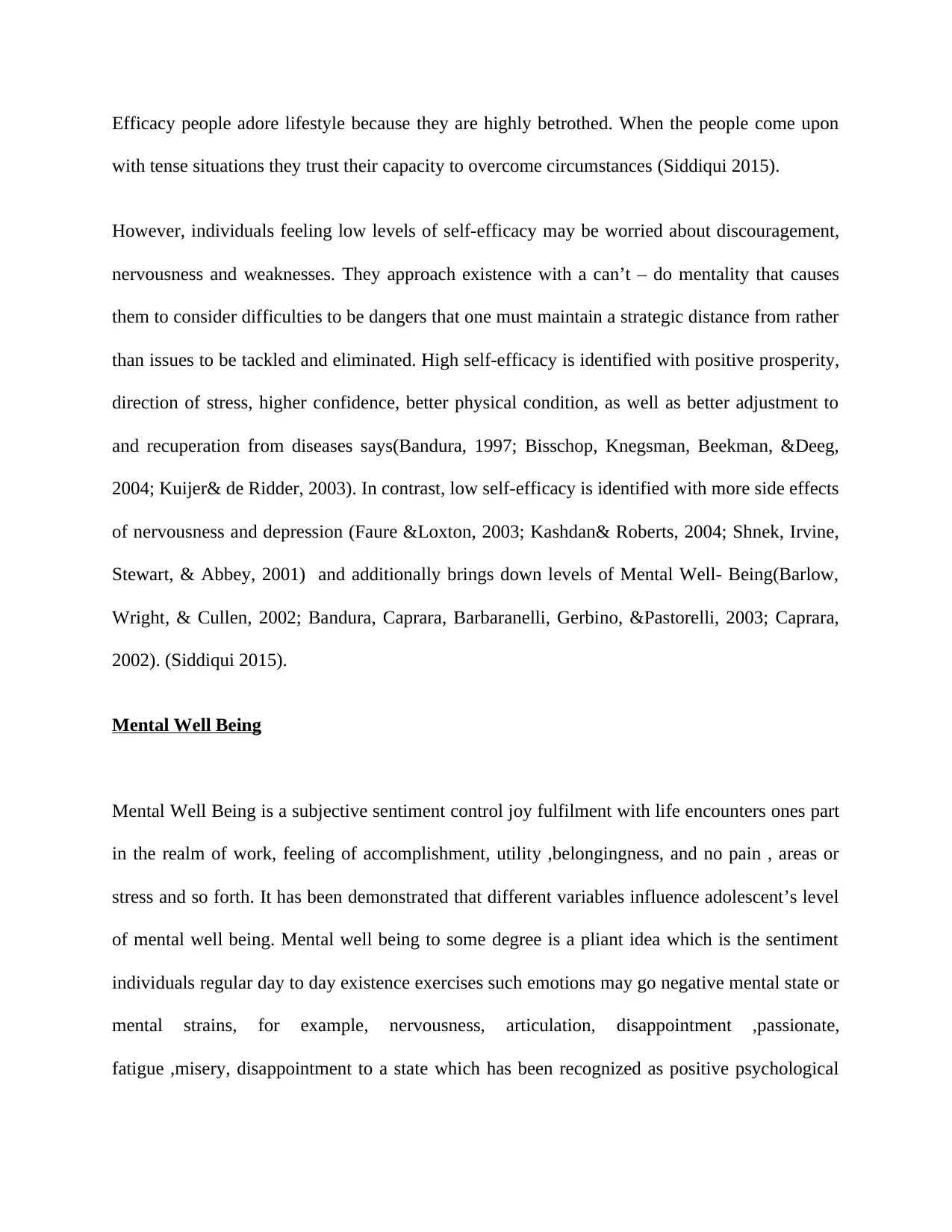
Efficacy people adore lifestyle because they are highly betrothed. When the people come upon
with tense situations they trust their capacity to overcome circumstances (Siddiqui 2015).
However, individuals feeling low levels of self-efficacy may be worried about discouragement,
nervousness and weaknesses. They approach existence with a can’t – do mentality that causes
them to consider difficulties to be dangers that one must maintain a strategic distance from rather
than issues to be tackled and eliminated. High self-efficacy is identified with positive prosperity,
direction of stress, higher confidence, better physical condition, as well as better adjustment to
and recuperation from diseases says(Bandura, 1997; Bisschop, Knegsman, Beekman, &Deeg,
2004; Kuijer& de Ridder, 2003). In contrast, low self-efficacy is identified with more side effects
of nervousness and depression (Faure &Loxton, 2003; Kashdan& Roberts, 2004; Shnek, Irvine,
Stewart, & Abbey, 2001) and additionally brings down levels of Mental Well- Being(Barlow,
Wright, & Cullen, 2002; Bandura, Caprara, Barbaranelli, Gerbino, &Pastorelli, 2003; Caprara,
2002). (Siddiqui 2015).
Mental Well Being
Mental Well Being is a subjective sentiment control joy fulfilment with life encounters ones part
in the realm of work, feeling of accomplishment, utility ,belongingness, and no pain , areas or
stress and so forth. It has been demonstrated that different variables influence adolescent’s level
of mental well being. Mental well being to some degree is a pliant idea which is the sentiment
individuals regular day to day existence exercises such emotions may go negative mental state or
mental strains, for example, nervousness, articulation, disappointment ,passionate,
fatigue ,misery, disappointment to a state which has been recognized as positive psychological
with tense situations they trust their capacity to overcome circumstances (Siddiqui 2015).
However, individuals feeling low levels of self-efficacy may be worried about discouragement,
nervousness and weaknesses. They approach existence with a can’t – do mentality that causes
them to consider difficulties to be dangers that one must maintain a strategic distance from rather
than issues to be tackled and eliminated. High self-efficacy is identified with positive prosperity,
direction of stress, higher confidence, better physical condition, as well as better adjustment to
and recuperation from diseases says(Bandura, 1997; Bisschop, Knegsman, Beekman, &Deeg,
2004; Kuijer& de Ridder, 2003). In contrast, low self-efficacy is identified with more side effects
of nervousness and depression (Faure &Loxton, 2003; Kashdan& Roberts, 2004; Shnek, Irvine,
Stewart, & Abbey, 2001) and additionally brings down levels of Mental Well- Being(Barlow,
Wright, & Cullen, 2002; Bandura, Caprara, Barbaranelli, Gerbino, &Pastorelli, 2003; Caprara,
2002). (Siddiqui 2015).
Mental Well Being
Mental Well Being is a subjective sentiment control joy fulfilment with life encounters ones part
in the realm of work, feeling of accomplishment, utility ,belongingness, and no pain , areas or
stress and so forth. It has been demonstrated that different variables influence adolescent’s level
of mental well being. Mental well being to some degree is a pliant idea which is the sentiment
individuals regular day to day existence exercises such emotions may go negative mental state or
mental strains, for example, nervousness, articulation, disappointment ,passionate,
fatigue ,misery, disappointment to a state which has been recognized as positive psychological
Paraphrase This Document
Need a fresh take? Get an instant paraphrase of this document with our AI Paraphraser
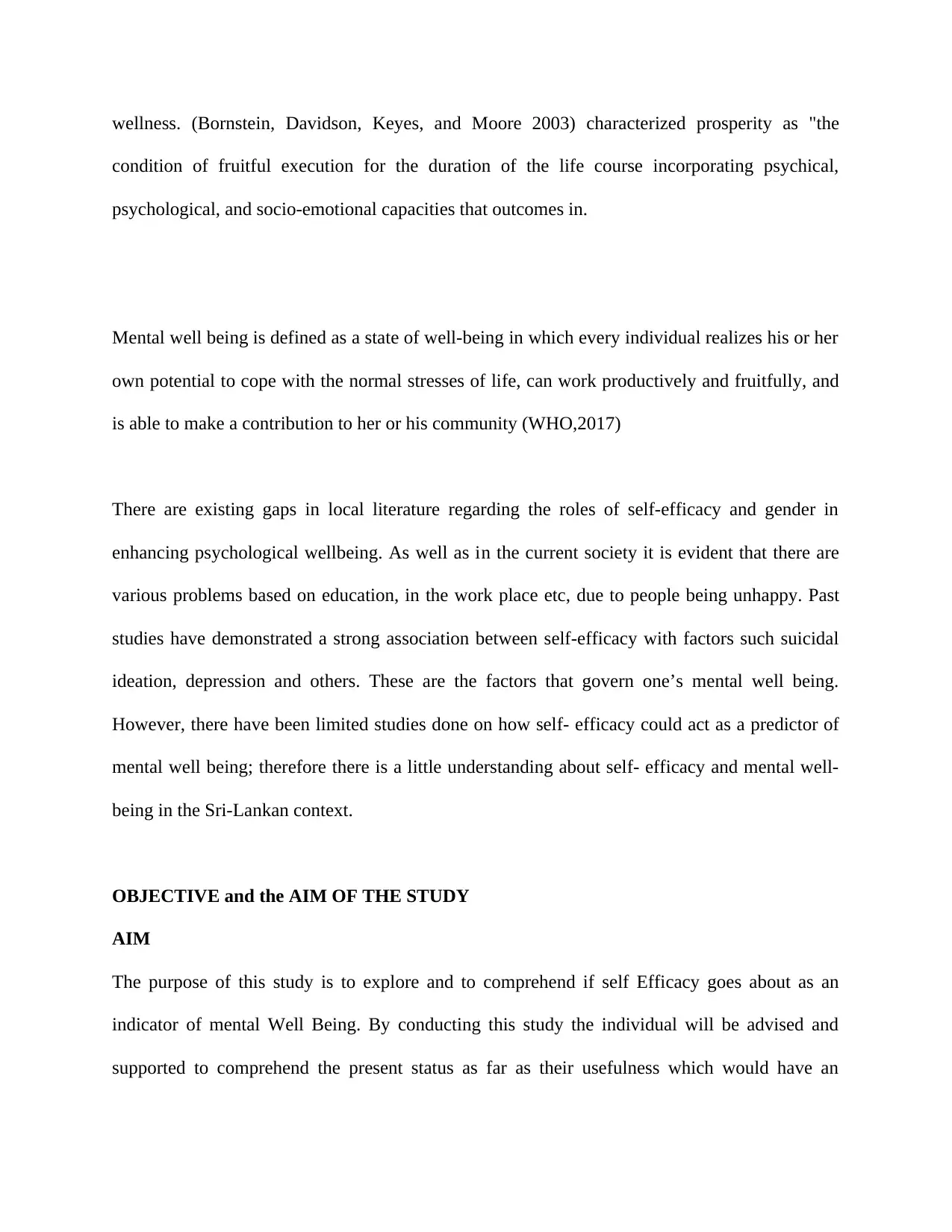
wellness. (Bornstein, Davidson, Keyes, and Moore 2003) characterized prosperity as "the
condition of fruitful execution for the duration of the life course incorporating psychical,
psychological, and socio-emotional capacities that outcomes in.
Mental well being is defined as a state of well-being in which every individual realizes his or her
own potential to cope with the normal stresses of life, can work productively and fruitfully, and
is able to make a contribution to her or his community (WHO,2017)
There are existing gaps in local literature regarding the roles of self-efficacy and gender in
enhancing psychological wellbeing. As well as in the current society it is evident that there are
various problems based on education, in the work place etc, due to people being unhappy. Past
studies have demonstrated a strong association between self-efficacy with factors such suicidal
ideation, depression and others. These are the factors that govern one’s mental well being.
However, there have been limited studies done on how self- efficacy could act as a predictor of
mental well being; therefore there is a little understanding about self- efficacy and mental well-
being in the Sri-Lankan context.
OBJECTIVE and the AIM OF THE STUDY
AIM
The purpose of this study is to explore and to comprehend if self Efficacy goes about as an
indicator of mental Well Being. By conducting this study the individual will be advised and
supported to comprehend the present status as far as their usefulness which would have an
condition of fruitful execution for the duration of the life course incorporating psychical,
psychological, and socio-emotional capacities that outcomes in.
Mental well being is defined as a state of well-being in which every individual realizes his or her
own potential to cope with the normal stresses of life, can work productively and fruitfully, and
is able to make a contribution to her or his community (WHO,2017)
There are existing gaps in local literature regarding the roles of self-efficacy and gender in
enhancing psychological wellbeing. As well as in the current society it is evident that there are
various problems based on education, in the work place etc, due to people being unhappy. Past
studies have demonstrated a strong association between self-efficacy with factors such suicidal
ideation, depression and others. These are the factors that govern one’s mental well being.
However, there have been limited studies done on how self- efficacy could act as a predictor of
mental well being; therefore there is a little understanding about self- efficacy and mental well-
being in the Sri-Lankan context.
OBJECTIVE and the AIM OF THE STUDY
AIM
The purpose of this study is to explore and to comprehend if self Efficacy goes about as an
indicator of mental Well Being. By conducting this study the individual will be advised and
supported to comprehend the present status as far as their usefulness which would have an
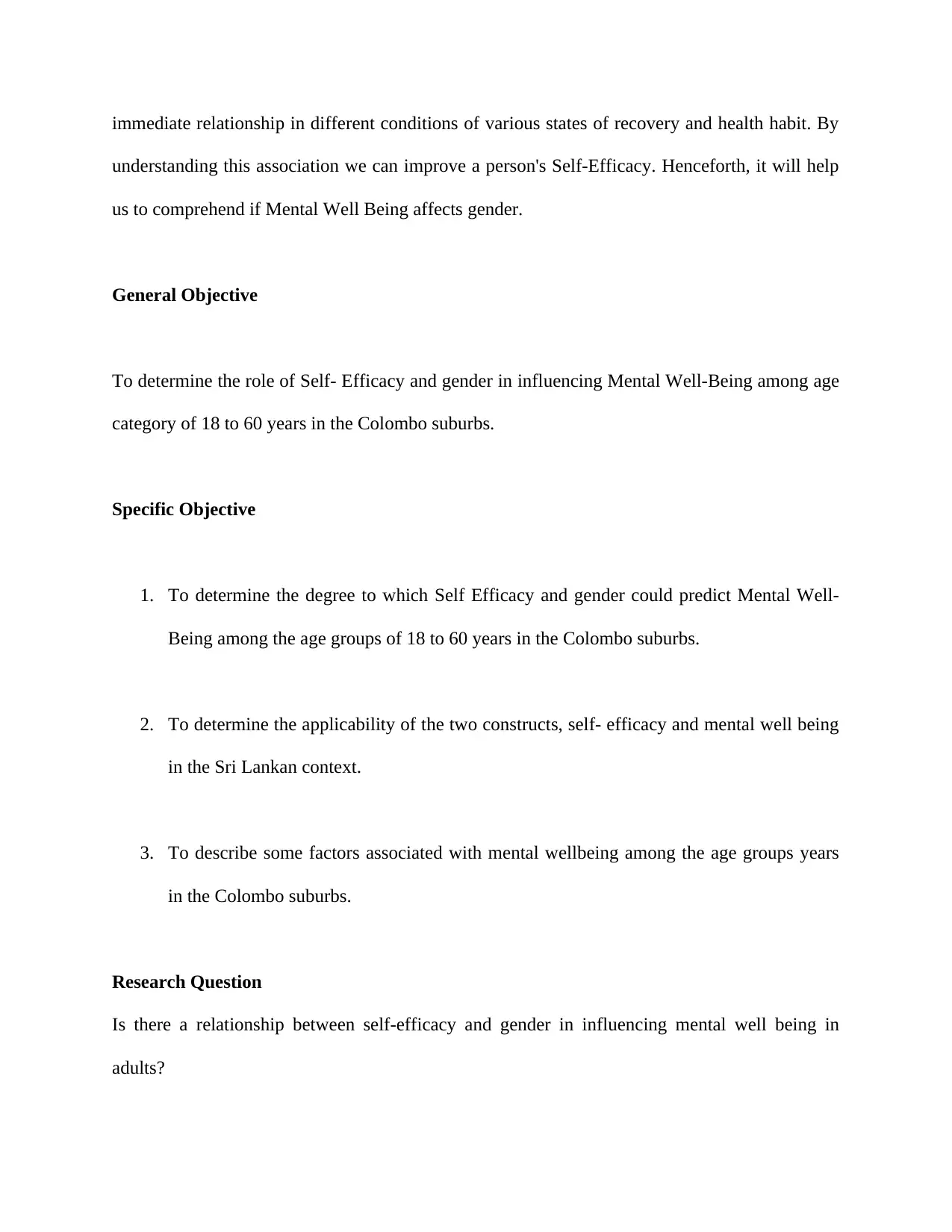
immediate relationship in different conditions of various states of recovery and health habit. By
understanding this association we can improve a person's Self-Efficacy. Henceforth, it will help
us to comprehend if Mental Well Being affects gender.
General Objective
To determine the role of Self- Efficacy and gender in influencing Mental Well-Being among age
category of 18 to 60 years in the Colombo suburbs.
Specific Objective
1. To determine the degree to which Self Efficacy and gender could predict Mental Well-
Being among the age groups of 18 to 60 years in the Colombo suburbs.
2. To determine the applicability of the two constructs, self- efficacy and mental well being
in the Sri Lankan context.
3. To describe some factors associated with mental wellbeing among the age groups years
in the Colombo suburbs.
Research Question
Is there a relationship between self-efficacy and gender in influencing mental well being in
adults?
understanding this association we can improve a person's Self-Efficacy. Henceforth, it will help
us to comprehend if Mental Well Being affects gender.
General Objective
To determine the role of Self- Efficacy and gender in influencing Mental Well-Being among age
category of 18 to 60 years in the Colombo suburbs.
Specific Objective
1. To determine the degree to which Self Efficacy and gender could predict Mental Well-
Being among the age groups of 18 to 60 years in the Colombo suburbs.
2. To determine the applicability of the two constructs, self- efficacy and mental well being
in the Sri Lankan context.
3. To describe some factors associated with mental wellbeing among the age groups years
in the Colombo suburbs.
Research Question
Is there a relationship between self-efficacy and gender in influencing mental well being in
adults?
⊘ This is a preview!⊘
Do you want full access?
Subscribe today to unlock all pages.

Trusted by 1+ million students worldwide
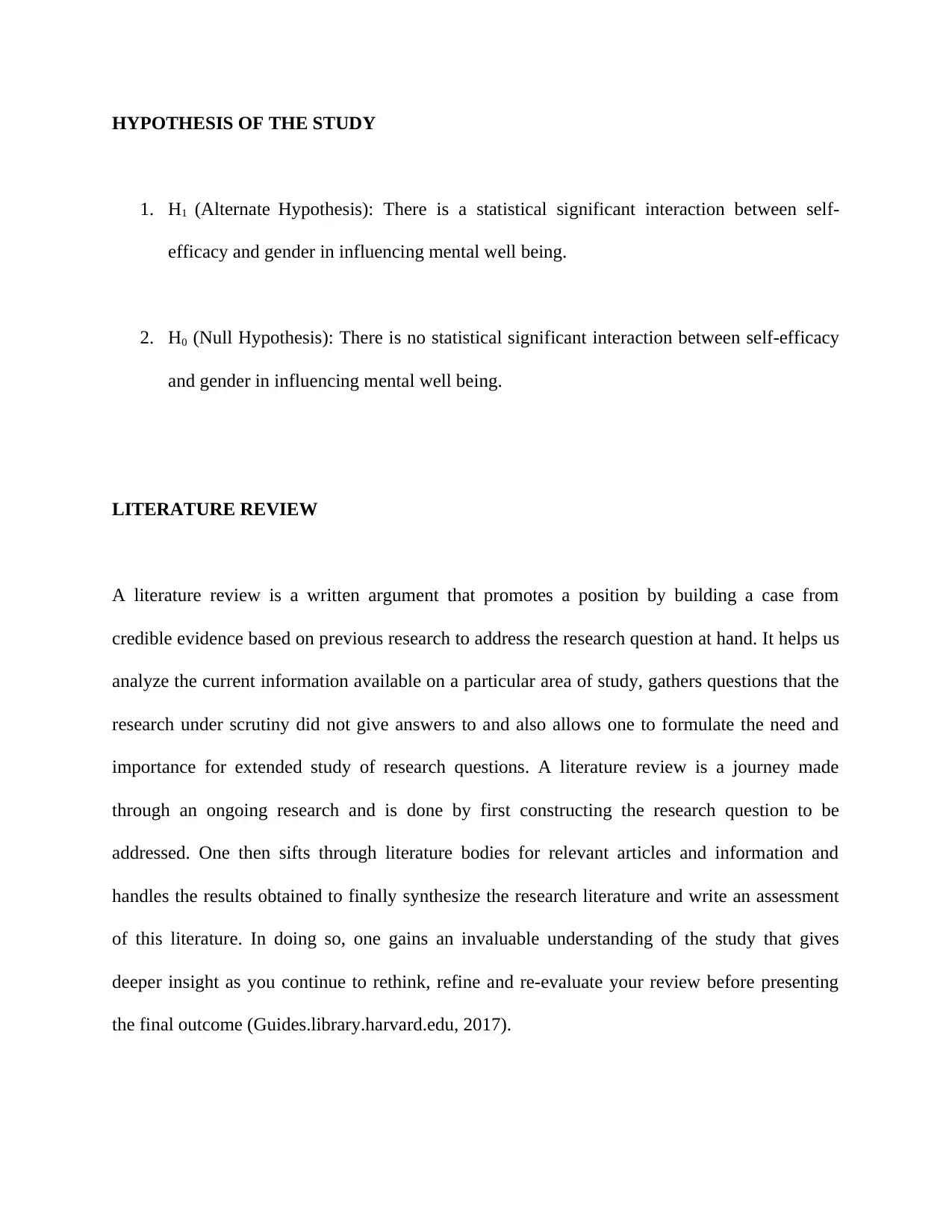
HYPOTHESIS OF THE STUDY
1. H1 (Alternate Hypothesis): There is a statistical significant interaction between self-
efficacy and gender in influencing mental well being.
2. H0 (Null Hypothesis): There is no statistical significant interaction between self-efficacy
and gender in influencing mental well being.
LITERATURE REVIEW
A literature review is a written argument that promotes a position by building a case from
credible evidence based on previous research to address the research question at hand. It helps us
analyze the current information available on a particular area of study, gathers questions that the
research under scrutiny did not give answers to and also allows one to formulate the need and
importance for extended study of research questions. A literature review is a journey made
through an ongoing research and is done by first constructing the research question to be
addressed. One then sifts through literature bodies for relevant articles and information and
handles the results obtained to finally synthesize the research literature and write an assessment
of this literature. In doing so, one gains an invaluable understanding of the study that gives
deeper insight as you continue to rethink, refine and re-evaluate your review before presenting
the final outcome (Guides.library.harvard.edu, 2017).
1. H1 (Alternate Hypothesis): There is a statistical significant interaction between self-
efficacy and gender in influencing mental well being.
2. H0 (Null Hypothesis): There is no statistical significant interaction between self-efficacy
and gender in influencing mental well being.
LITERATURE REVIEW
A literature review is a written argument that promotes a position by building a case from
credible evidence based on previous research to address the research question at hand. It helps us
analyze the current information available on a particular area of study, gathers questions that the
research under scrutiny did not give answers to and also allows one to formulate the need and
importance for extended study of research questions. A literature review is a journey made
through an ongoing research and is done by first constructing the research question to be
addressed. One then sifts through literature bodies for relevant articles and information and
handles the results obtained to finally synthesize the research literature and write an assessment
of this literature. In doing so, one gains an invaluable understanding of the study that gives
deeper insight as you continue to rethink, refine and re-evaluate your review before presenting
the final outcome (Guides.library.harvard.edu, 2017).
Paraphrase This Document
Need a fresh take? Get an instant paraphrase of this document with our AI Paraphraser
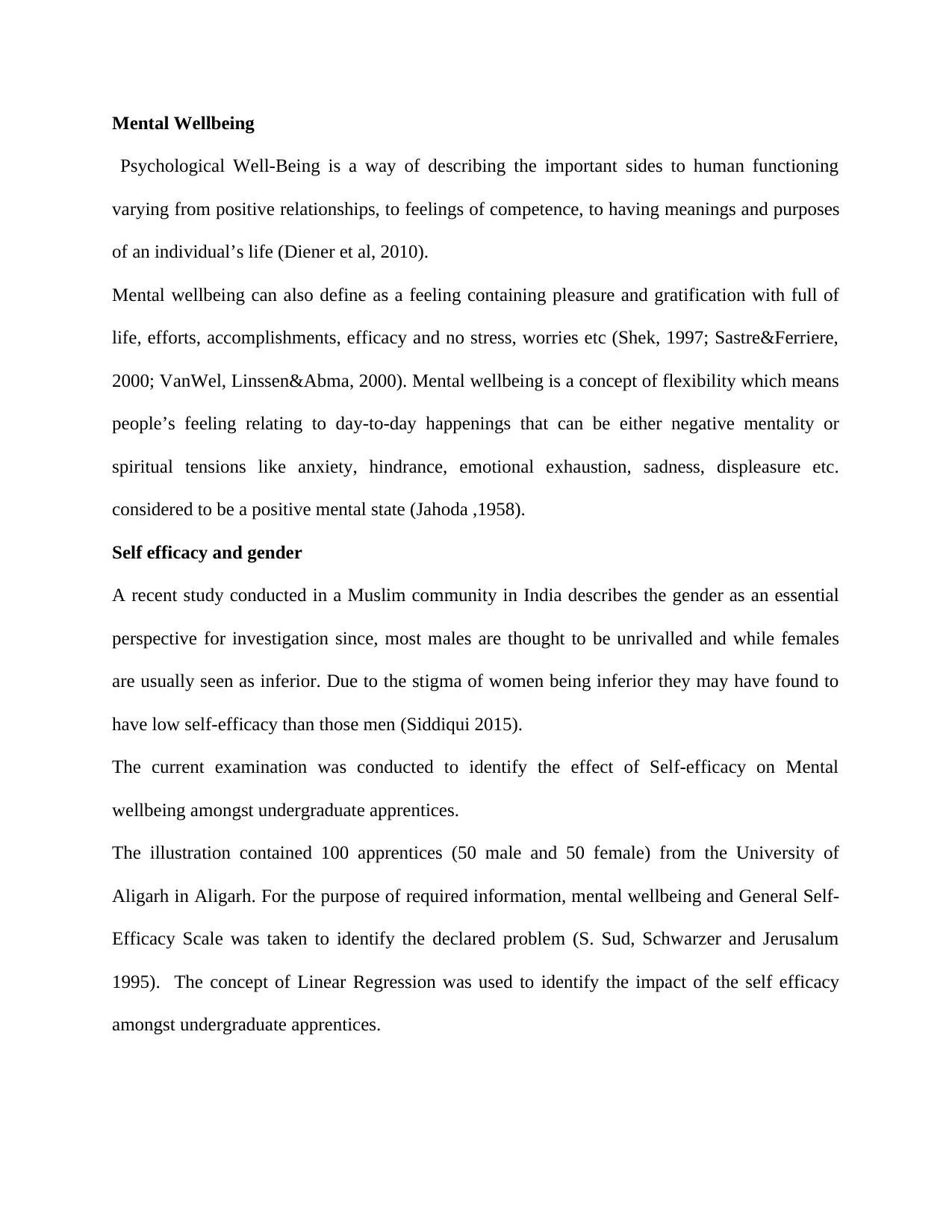
Mental Wellbeing
Psychological Well-Being is a way of describing the important sides to human functioning
varying from positive relationships, to feelings of competence, to having meanings and purposes
of an individual’s life (Diener et al, 2010).
Mental wellbeing can also define as a feeling containing pleasure and gratification with full of
life, efforts, accomplishments, efficacy and no stress, worries etc (Shek, 1997; Sastre&Ferriere,
2000; VanWel, Linssen&Abma, 2000). Mental wellbeing is a concept of flexibility which means
people’s feeling relating to day-to-day happenings that can be either negative mentality or
spiritual tensions like anxiety, hindrance, emotional exhaustion, sadness, displeasure etc.
considered to be a positive mental state (Jahoda ,1958).
Self efficacy and gender
A recent study conducted in a Muslim community in India describes the gender as an essential
perspective for investigation since, most males are thought to be unrivalled and while females
are usually seen as inferior. Due to the stigma of women being inferior they may have found to
have low self-efficacy than those men (Siddiqui 2015).
The current examination was conducted to identify the effect of Self-efficacy on Mental
wellbeing amongst undergraduate apprentices.
The illustration contained 100 apprentices (50 male and 50 female) from the University of
Aligarh in Aligarh. For the purpose of required information, mental wellbeing and General Self-
Efficacy Scale was taken to identify the declared problem (S. Sud, Schwarzer and Jerusalum
1995). The concept of Linear Regression was used to identify the impact of the self efficacy
amongst undergraduate apprentices.
Psychological Well-Being is a way of describing the important sides to human functioning
varying from positive relationships, to feelings of competence, to having meanings and purposes
of an individual’s life (Diener et al, 2010).
Mental wellbeing can also define as a feeling containing pleasure and gratification with full of
life, efforts, accomplishments, efficacy and no stress, worries etc (Shek, 1997; Sastre&Ferriere,
2000; VanWel, Linssen&Abma, 2000). Mental wellbeing is a concept of flexibility which means
people’s feeling relating to day-to-day happenings that can be either negative mentality or
spiritual tensions like anxiety, hindrance, emotional exhaustion, sadness, displeasure etc.
considered to be a positive mental state (Jahoda ,1958).
Self efficacy and gender
A recent study conducted in a Muslim community in India describes the gender as an essential
perspective for investigation since, most males are thought to be unrivalled and while females
are usually seen as inferior. Due to the stigma of women being inferior they may have found to
have low self-efficacy than those men (Siddiqui 2015).
The current examination was conducted to identify the effect of Self-efficacy on Mental
wellbeing amongst undergraduate apprentices.
The illustration contained 100 apprentices (50 male and 50 female) from the University of
Aligarh in Aligarh. For the purpose of required information, mental wellbeing and General Self-
Efficacy Scale was taken to identify the declared problem (S. Sud, Schwarzer and Jerusalum
1995). The concept of Linear Regression was used to identify the impact of the self efficacy
amongst undergraduate apprentices.
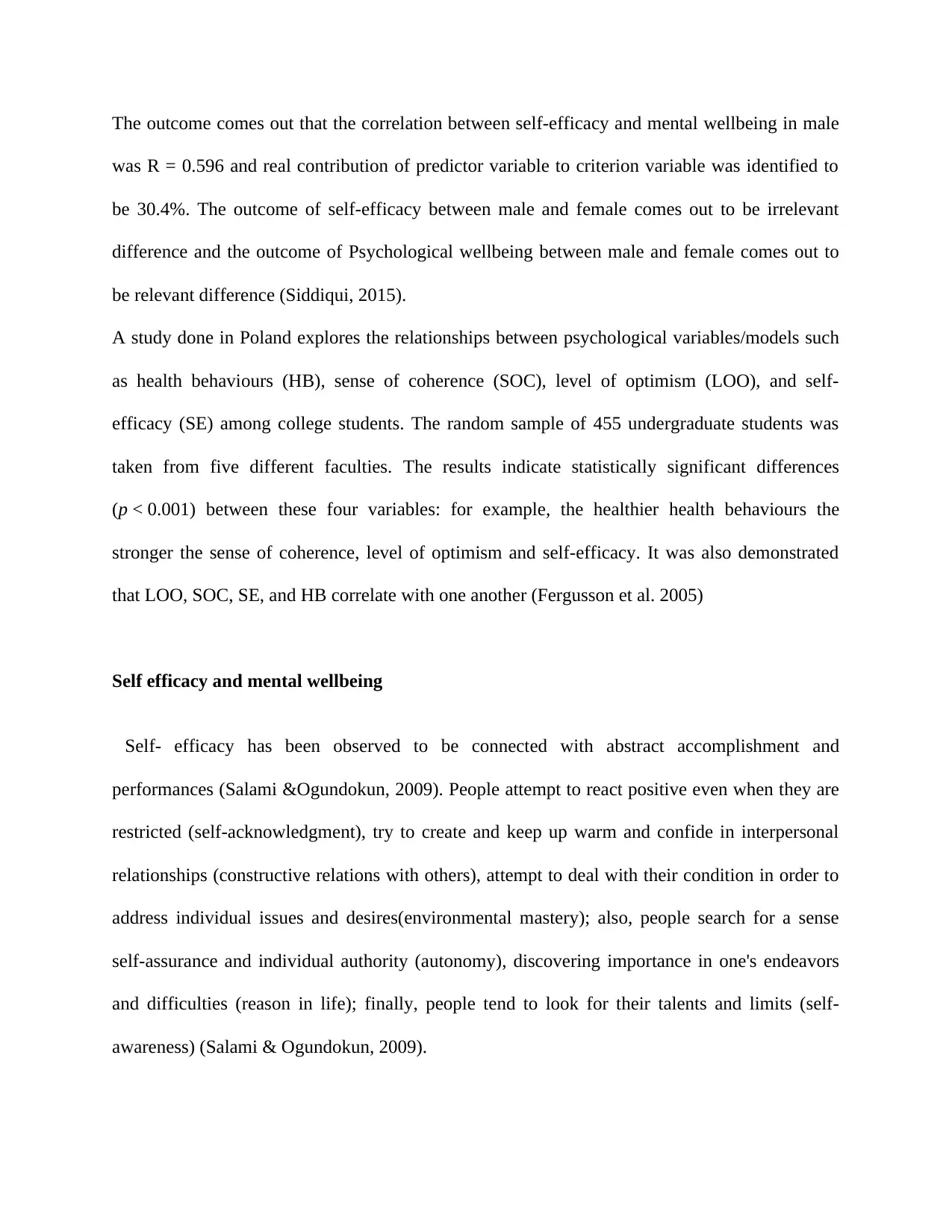
The outcome comes out that the correlation between self-efficacy and mental wellbeing in male
was R = 0.596 and real contribution of predictor variable to criterion variable was identified to
be 30.4%. The outcome of self-efficacy between male and female comes out to be irrelevant
difference and the outcome of Psychological wellbeing between male and female comes out to
be relevant difference (Siddiqui, 2015).
A study done in Poland explores the relationships between psychological variables/models such
as health behaviours (HB), sense of coherence (SOC), level of optimism (LOO), and self-
efficacy (SE) among college students. The random sample of 455 undergraduate students was
taken from five different faculties. The results indicate statistically significant differences
(p < 0.001) between these four variables: for example, the healthier health behaviours the
stronger the sense of coherence, level of optimism and self-efficacy. It was also demonstrated
that LOO, SOC, SE, and HB correlate with one another (Fergusson et al. 2005)
Self efficacy and mental wellbeing
Self- efficacy has been observed to be connected with abstract accomplishment and
performances (Salami &Ogundokun, 2009). People attempt to react positive even when they are
restricted (self-acknowledgment), try to create and keep up warm and confide in interpersonal
relationships (constructive relations with others), attempt to deal with their condition in order to
address individual issues and desires(environmental mastery); also, people search for a sense
self-assurance and individual authority (autonomy), discovering importance in one's endeavors
and difficulties (reason in life); finally, people tend to look for their talents and limits (self-
awareness) (Salami & Ogundokun, 2009).
was R = 0.596 and real contribution of predictor variable to criterion variable was identified to
be 30.4%. The outcome of self-efficacy between male and female comes out to be irrelevant
difference and the outcome of Psychological wellbeing between male and female comes out to
be relevant difference (Siddiqui, 2015).
A study done in Poland explores the relationships between psychological variables/models such
as health behaviours (HB), sense of coherence (SOC), level of optimism (LOO), and self-
efficacy (SE) among college students. The random sample of 455 undergraduate students was
taken from five different faculties. The results indicate statistically significant differences
(p < 0.001) between these four variables: for example, the healthier health behaviours the
stronger the sense of coherence, level of optimism and self-efficacy. It was also demonstrated
that LOO, SOC, SE, and HB correlate with one another (Fergusson et al. 2005)
Self efficacy and mental wellbeing
Self- efficacy has been observed to be connected with abstract accomplishment and
performances (Salami &Ogundokun, 2009). People attempt to react positive even when they are
restricted (self-acknowledgment), try to create and keep up warm and confide in interpersonal
relationships (constructive relations with others), attempt to deal with their condition in order to
address individual issues and desires(environmental mastery); also, people search for a sense
self-assurance and individual authority (autonomy), discovering importance in one's endeavors
and difficulties (reason in life); finally, people tend to look for their talents and limits (self-
awareness) (Salami & Ogundokun, 2009).
⊘ This is a preview!⊘
Do you want full access?
Subscribe today to unlock all pages.

Trusted by 1+ million students worldwide
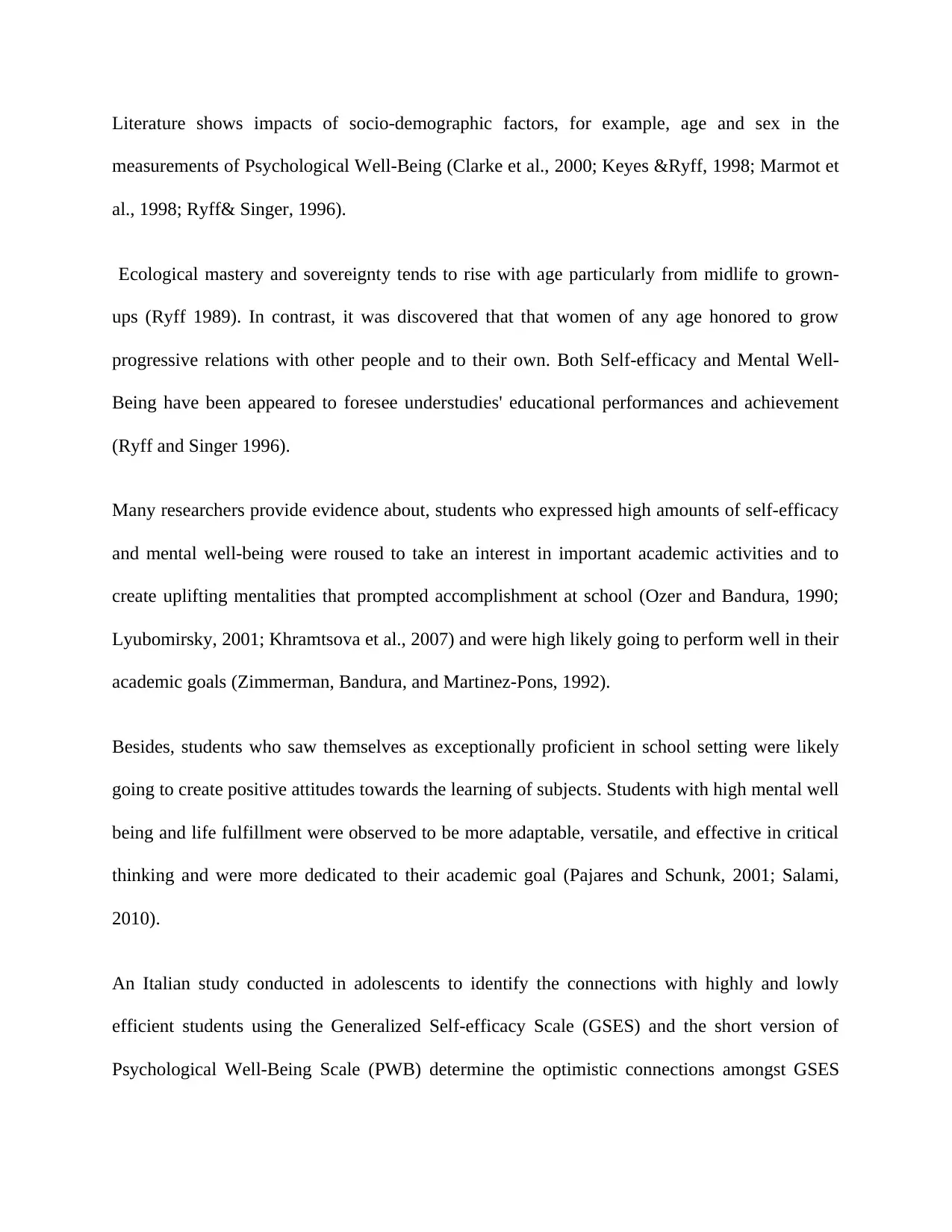
Literature shows impacts of socio-demographic factors, for example, age and sex in the
measurements of Psychological Well-Being (Clarke et al., 2000; Keyes &Ryff, 1998; Marmot et
al., 1998; Ryff& Singer, 1996).
Ecological mastery and sovereignty tends to rise with age particularly from midlife to grown-
ups (Ryff 1989). In contrast, it was discovered that that women of any age honored to grow
progressive relations with other people and to their own. Both Self-efficacy and Mental Well-
Being have been appeared to foresee understudies' educational performances and achievement
(Ryff and Singer 1996).
Many researchers provide evidence about, students who expressed high amounts of self-efficacy
and mental well-being were roused to take an interest in important academic activities and to
create uplifting mentalities that prompted accomplishment at school (Ozer and Bandura, 1990;
Lyubomirsky, 2001; Khramtsova et al., 2007) and were high likely going to perform well in their
academic goals (Zimmerman, Bandura, and Martinez-Pons, 1992).
Besides, students who saw themselves as exceptionally proficient in school setting were likely
going to create positive attitudes towards the learning of subjects. Students with high mental well
being and life fulfillment were observed to be more adaptable, versatile, and effective in critical
thinking and were more dedicated to their academic goal (Pajares and Schunk, 2001; Salami,
2010).
An Italian study conducted in adolescents to identify the connections with highly and lowly
efficient students using the Generalized Self-efficacy Scale (GSES) and the short version of
Psychological Well-Being Scale (PWB) determine the optimistic connections amongst GSES
measurements of Psychological Well-Being (Clarke et al., 2000; Keyes &Ryff, 1998; Marmot et
al., 1998; Ryff& Singer, 1996).
Ecological mastery and sovereignty tends to rise with age particularly from midlife to grown-
ups (Ryff 1989). In contrast, it was discovered that that women of any age honored to grow
progressive relations with other people and to their own. Both Self-efficacy and Mental Well-
Being have been appeared to foresee understudies' educational performances and achievement
(Ryff and Singer 1996).
Many researchers provide evidence about, students who expressed high amounts of self-efficacy
and mental well-being were roused to take an interest in important academic activities and to
create uplifting mentalities that prompted accomplishment at school (Ozer and Bandura, 1990;
Lyubomirsky, 2001; Khramtsova et al., 2007) and were high likely going to perform well in their
academic goals (Zimmerman, Bandura, and Martinez-Pons, 1992).
Besides, students who saw themselves as exceptionally proficient in school setting were likely
going to create positive attitudes towards the learning of subjects. Students with high mental well
being and life fulfillment were observed to be more adaptable, versatile, and effective in critical
thinking and were more dedicated to their academic goal (Pajares and Schunk, 2001; Salami,
2010).
An Italian study conducted in adolescents to identify the connections with highly and lowly
efficient students using the Generalized Self-efficacy Scale (GSES) and the short version of
Psychological Well-Being Scale (PWB) determine the optimistic connections amongst GSES
Paraphrase This Document
Need a fresh take? Get an instant paraphrase of this document with our AI Paraphraser
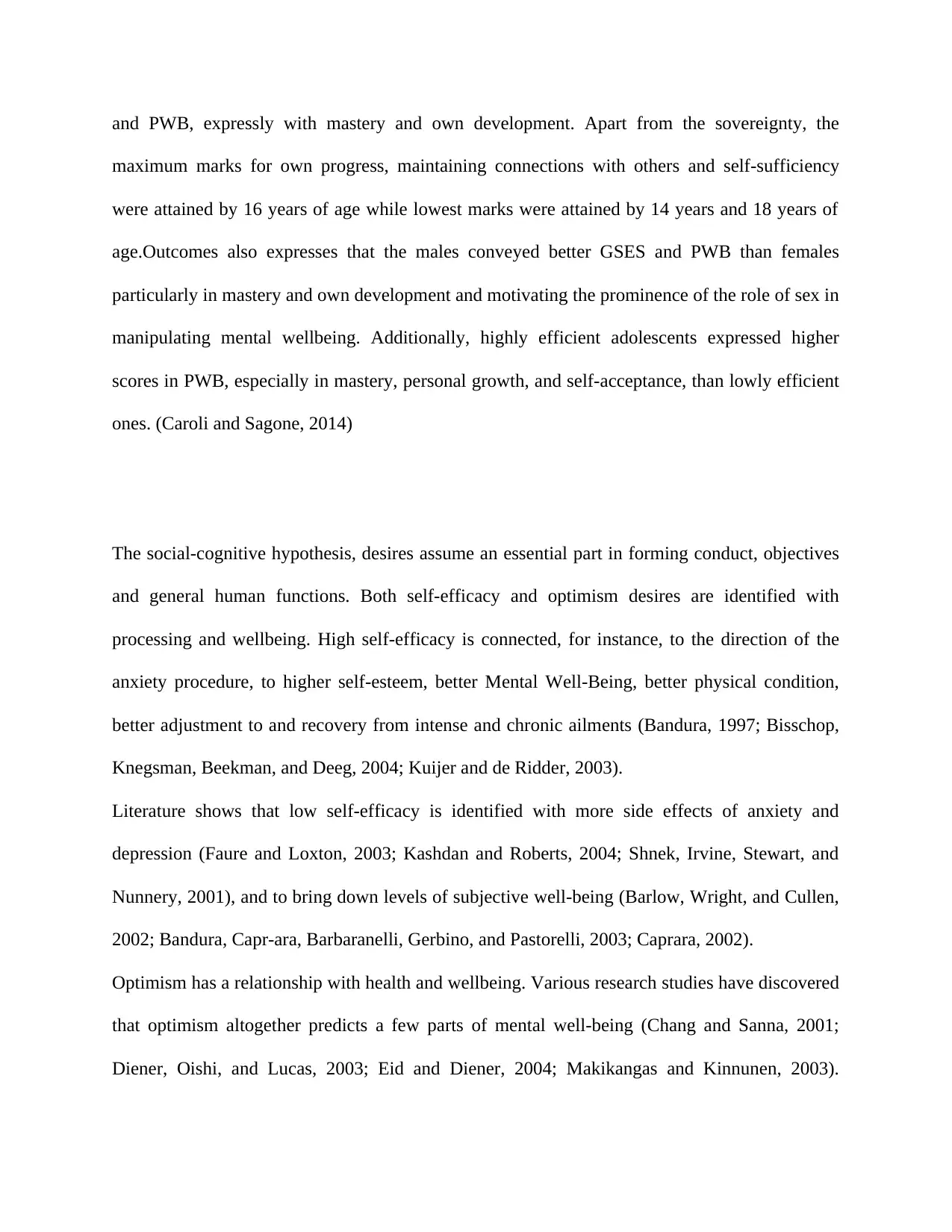
and PWB, expressly with mastery and own development. Apart from the sovereignty, the
maximum marks for own progress, maintaining connections with others and self-sufficiency
were attained by 16 years of age while lowest marks were attained by 14 years and 18 years of
age.Outcomes also expresses that the males conveyed better GSES and PWB than females
particularly in mastery and own development and motivating the prominence of the role of sex in
manipulating mental wellbeing. Additionally, highly efficient adolescents expressed higher
scores in PWB, especially in mastery, personal growth, and self-acceptance, than lowly efficient
ones. (Caroli and Sagone, 2014)
The social-cognitive hypothesis, desires assume an essential part in forming conduct, objectives
and general human functions. Both self-efficacy and optimism desires are identified with
processing and wellbeing. High self-efficacy is connected, for instance, to the direction of the
anxiety procedure, to higher self-esteem, better Mental Well-Being, better physical condition,
better adjustment to and recovery from intense and chronic ailments (Bandura, 1997; Bisschop,
Knegsman, Beekman, and Deeg, 2004; Kuijer and de Ridder, 2003).
Literature shows that low self-efficacy is identified with more side effects of anxiety and
depression (Faure and Loxton, 2003; Kashdan and Roberts, 2004; Shnek, Irvine, Stewart, and
Nunnery, 2001), and to bring down levels of subjective well-being (Barlow, Wright, and Cullen,
2002; Bandura, Capr-ara, Barbaranelli, Gerbino, and Pastorelli, 2003; Caprara, 2002).
Optimism has a relationship with health and wellbeing. Various research studies have discovered
that optimism altogether predicts a few parts of mental well-being (Chang and Sanna, 2001;
Diener, Oishi, and Lucas, 2003; Eid and Diener, 2004; Makikangas and Kinnunen, 2003).
maximum marks for own progress, maintaining connections with others and self-sufficiency
were attained by 16 years of age while lowest marks were attained by 14 years and 18 years of
age.Outcomes also expresses that the males conveyed better GSES and PWB than females
particularly in mastery and own development and motivating the prominence of the role of sex in
manipulating mental wellbeing. Additionally, highly efficient adolescents expressed higher
scores in PWB, especially in mastery, personal growth, and self-acceptance, than lowly efficient
ones. (Caroli and Sagone, 2014)
The social-cognitive hypothesis, desires assume an essential part in forming conduct, objectives
and general human functions. Both self-efficacy and optimism desires are identified with
processing and wellbeing. High self-efficacy is connected, for instance, to the direction of the
anxiety procedure, to higher self-esteem, better Mental Well-Being, better physical condition,
better adjustment to and recovery from intense and chronic ailments (Bandura, 1997; Bisschop,
Knegsman, Beekman, and Deeg, 2004; Kuijer and de Ridder, 2003).
Literature shows that low self-efficacy is identified with more side effects of anxiety and
depression (Faure and Loxton, 2003; Kashdan and Roberts, 2004; Shnek, Irvine, Stewart, and
Nunnery, 2001), and to bring down levels of subjective well-being (Barlow, Wright, and Cullen,
2002; Bandura, Capr-ara, Barbaranelli, Gerbino, and Pastorelli, 2003; Caprara, 2002).
Optimism has a relationship with health and wellbeing. Various research studies have discovered
that optimism altogether predicts a few parts of mental well-being (Chang and Sanna, 2001;
Diener, Oishi, and Lucas, 2003; Eid and Diener, 2004; Makikangas and Kinnunen, 2003).
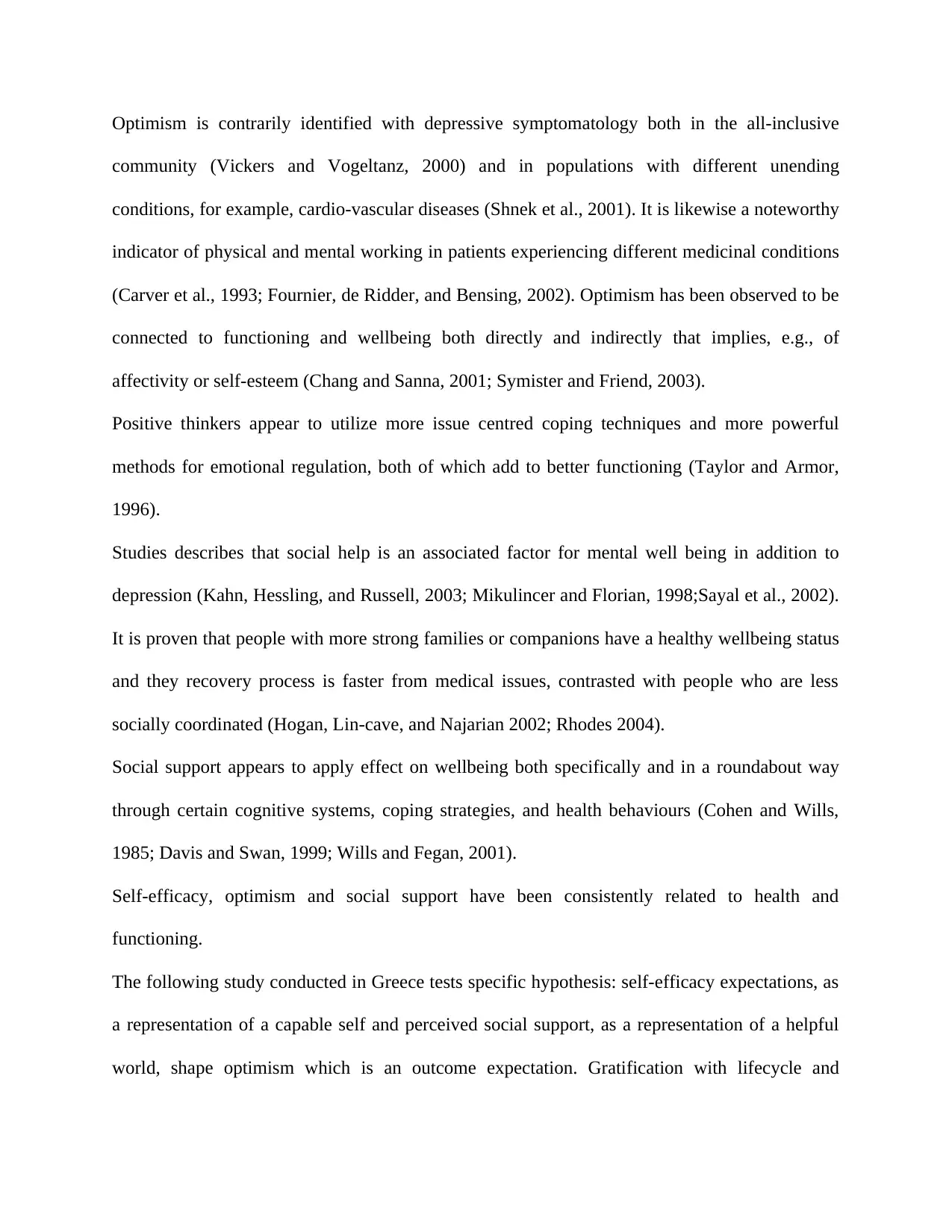
Optimism is contrarily identified with depressive symptomatology both in the all-inclusive
community (Vickers and Vogeltanz, 2000) and in populations with different unending
conditions, for example, cardio-vascular diseases (Shnek et al., 2001). It is likewise a noteworthy
indicator of physical and mental working in patients experiencing different medicinal conditions
(Carver et al., 1993; Fournier, de Ridder, and Bensing, 2002). Optimism has been observed to be
connected to functioning and wellbeing both directly and indirectly that implies, e.g., of
affectivity or self-esteem (Chang and Sanna, 2001; Symister and Friend, 2003).
Positive thinkers appear to utilize more issue centred coping techniques and more powerful
methods for emotional regulation, both of which add to better functioning (Taylor and Armor,
1996).
Studies describes that social help is an associated factor for mental well being in addition to
depression (Kahn, Hessling, and Russell, 2003; Mikulincer and Florian, 1998;Sayal et al., 2002).
It is proven that people with more strong families or companions have a healthy wellbeing status
and they recovery process is faster from medical issues, contrasted with people who are less
socially coordinated (Hogan, Lin-cave, and Najarian 2002; Rhodes 2004).
Social support appears to apply effect on wellbeing both specifically and in a roundabout way
through certain cognitive systems, coping strategies, and health behaviours (Cohen and Wills,
1985; Davis and Swan, 1999; Wills and Fegan, 2001).
Self-efficacy, optimism and social support have been consistently related to health and
functioning.
The following study conducted in Greece tests specific hypothesis: self-efficacy expectations, as
a representation of a capable self and perceived social support, as a representation of a helpful
world, shape optimism which is an outcome expectation. Gratification with lifecycle and
community (Vickers and Vogeltanz, 2000) and in populations with different unending
conditions, for example, cardio-vascular diseases (Shnek et al., 2001). It is likewise a noteworthy
indicator of physical and mental working in patients experiencing different medicinal conditions
(Carver et al., 1993; Fournier, de Ridder, and Bensing, 2002). Optimism has been observed to be
connected to functioning and wellbeing both directly and indirectly that implies, e.g., of
affectivity or self-esteem (Chang and Sanna, 2001; Symister and Friend, 2003).
Positive thinkers appear to utilize more issue centred coping techniques and more powerful
methods for emotional regulation, both of which add to better functioning (Taylor and Armor,
1996).
Studies describes that social help is an associated factor for mental well being in addition to
depression (Kahn, Hessling, and Russell, 2003; Mikulincer and Florian, 1998;Sayal et al., 2002).
It is proven that people with more strong families or companions have a healthy wellbeing status
and they recovery process is faster from medical issues, contrasted with people who are less
socially coordinated (Hogan, Lin-cave, and Najarian 2002; Rhodes 2004).
Social support appears to apply effect on wellbeing both specifically and in a roundabout way
through certain cognitive systems, coping strategies, and health behaviours (Cohen and Wills,
1985; Davis and Swan, 1999; Wills and Fegan, 2001).
Self-efficacy, optimism and social support have been consistently related to health and
functioning.
The following study conducted in Greece tests specific hypothesis: self-efficacy expectations, as
a representation of a capable self and perceived social support, as a representation of a helpful
world, shape optimism which is an outcome expectation. Gratification with lifecycle and
⊘ This is a preview!⊘
Do you want full access?
Subscribe today to unlock all pages.

Trusted by 1+ million students worldwide
1 out of 20
Related Documents
Your All-in-One AI-Powered Toolkit for Academic Success.
+13062052269
info@desklib.com
Available 24*7 on WhatsApp / Email
![[object Object]](/_next/static/media/star-bottom.7253800d.svg)
Unlock your academic potential
Copyright © 2020–2026 A2Z Services. All Rights Reserved. Developed and managed by ZUCOL.





